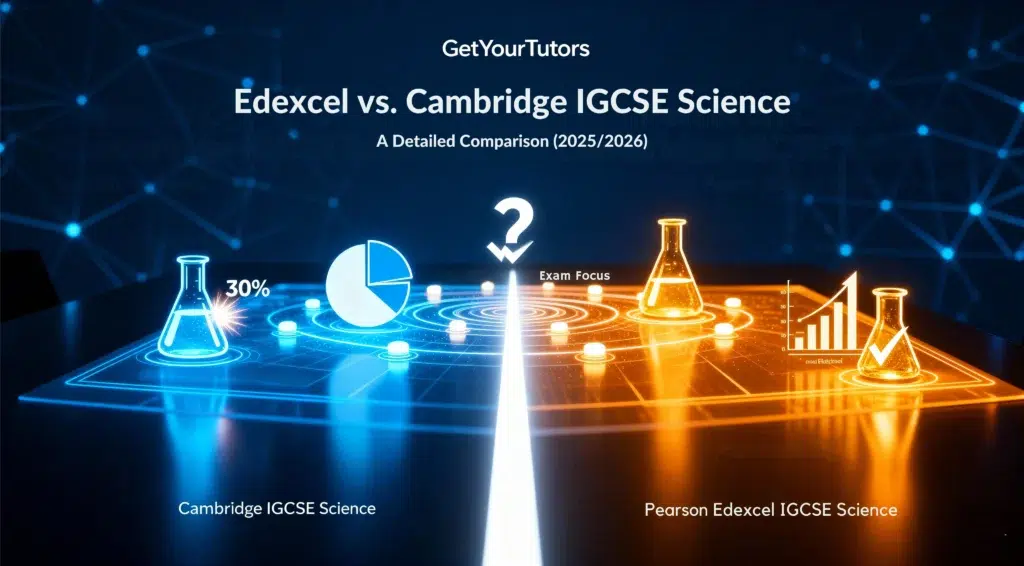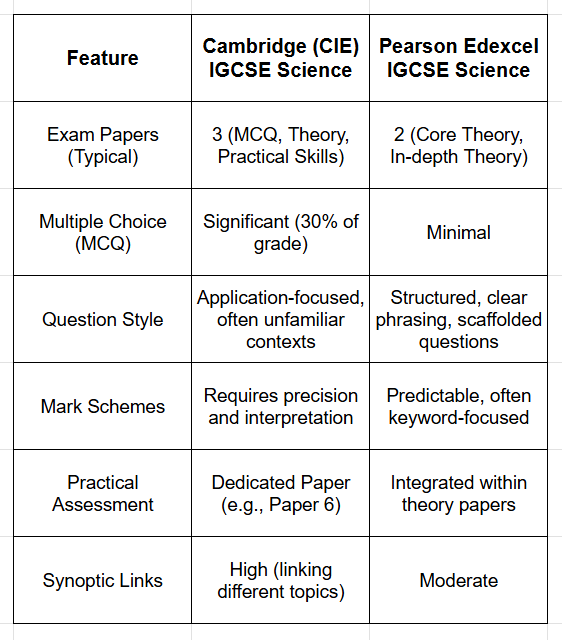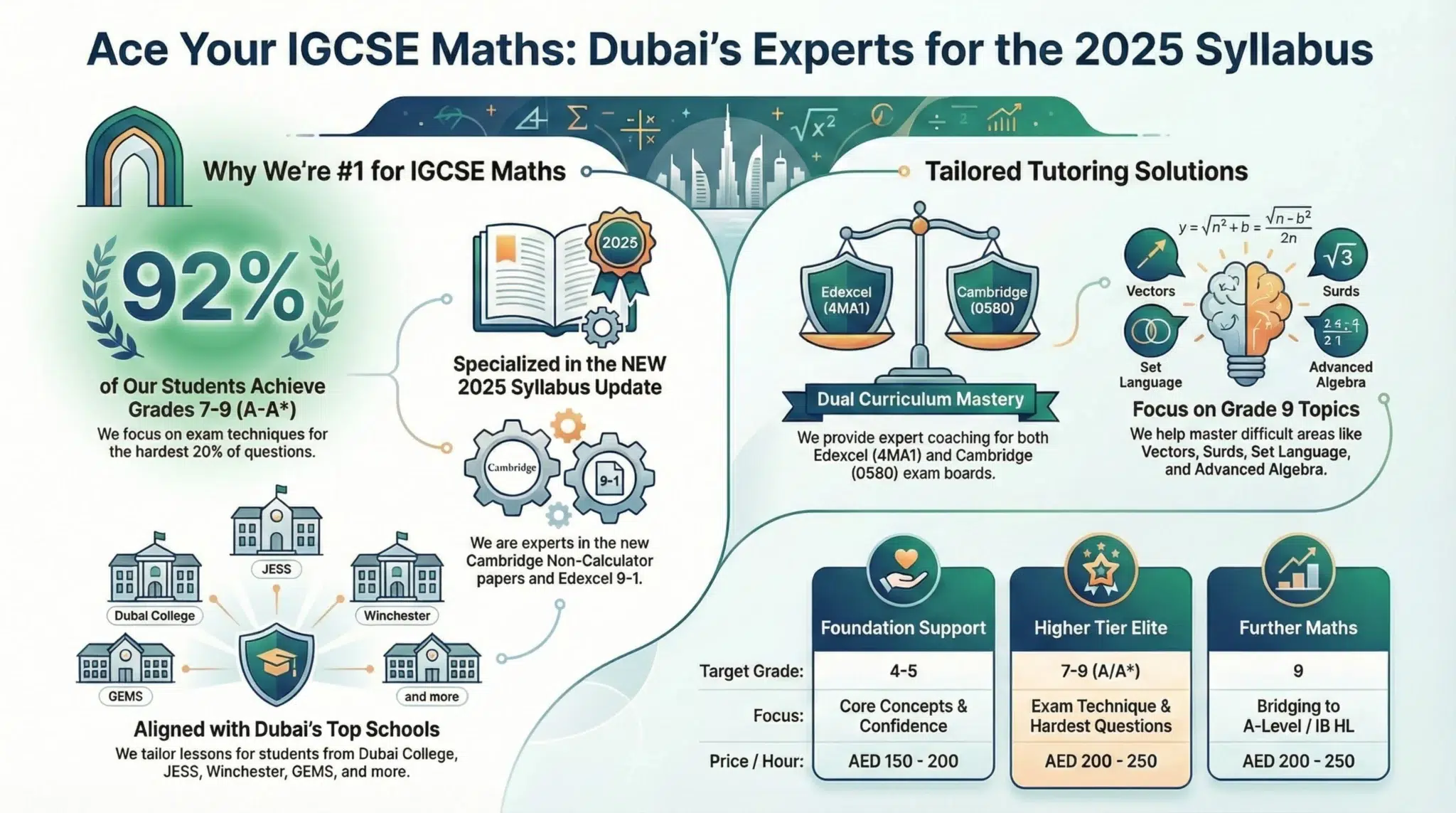Edexcel vs. Cambridge IGCSE Science: A Detailed Comparison (2025/2026)
1. Introduction: The IGCSE Science Dilemma in Dubai
For students undertaking the British Curriculum in Dubai, IGCSE Sciences (Biology, Chemistry, and Physics) are foundational subjects. However, parents and students often face confusion regarding the different exam boards offered by schools. The two dominant providers are Pearson Edexcel and Cambridge Assessment International Education (CIE).
A common question arises: “Which one is harder?” The answer is crucial for students choosing schools, selecting subjects, or seeking the right academic support.

When comparing Edexcel and Cambridge IGCSE Science, neither is definitively “harder”; rather, they present different challenges. Cambridge (CIE) is often perceived as more rigorous due to its emphasis on critical thinking, application of knowledge in unfamiliar contexts, and extensive use of multiple-choice questions. Pearson Edexcel is often viewed as more accessible due to its structured approach, clearer question phrasing, and more predictable mark schemes. The “harder” board depends on the student’s learning style and assessment strengths.
This guide will analyze the differences in assessment style, content depth, and philosophy between Edexcel and Cambridge IGCSE Sciences for the 2025/2026 academic year.
2. The Fundamental Philosophies
While both boards adhere to the standards of the IGCSE qualification and cover similar core scientific principles, their underlying philosophies differ, which influences how content is taught and assessed.
Cambridge International (CIE): Rigor and Application
Cambridge has a long-standing reputation for academic rigor and traditional assessment.
Philosophy: CIE emphasizes a deep theoretical understanding of scientific concepts and the ability to apply this knowledge critically.
The Student Experience: Students are expected to think like scientists, analyze data, and solve problems presented in novel or unfamiliar contexts. The syllabus encourages synoptic learning (linking concepts across different topics).
Pearson Edexcel: Structure and Accessibility
Edexcel is known for its modern, structured approach, designed to be accessible to a wide range of international students.
Philosophy: Edexcel focuses on clear communication, structured progression, and the ability to recall and explain scientific processes.
The Student Experience: Students often find Edexcel’s materials and exams straightforward. Questions are typically phrased clearly, often broken down into smaller, scaffolded parts that guide the student through the problem.
3. Assessment Style Comparison: Where the Differences Lie
The most significant divergence between the two boards is in how they structure their examinations and the types of questions they ask.
Exam Structure Overview
The structure of the exams varies significantly, particularly with Cambridge’s use of different papers targeting specific skills.
Cambridge (CIE) Exam Structure
CIE typically uses three papers for each science subject (for students taking the Extended syllabus, which is the norm for those aiming for higher grades):
Paper 2 (Multiple Choice – Extended): Fast-paced assessment of knowledge across the entire syllabus.
Paper 4 (Theory – Extended): Structured questions requiring short answers and longer explanations, focusing on understanding and application.
Paper 6 (Alternative to Practical): A written paper assessing practical skills, experimental design, and data analysis (Note: Some schools may opt for Paper 5, a lab-based practical, but Paper 6 is more common internationally).
Pearson Edexcel Exam Structure
Edexcel typically uses two papers for each science subject:
Paper 1: Assesses core content across the syllabus. It includes a mix of question styles (structured, short answer, calculations).
Paper 2: Assesses topics in greater depth and often includes questions that require longer responses or relate to the practical investigations covered in the syllabus.
The Role of Multiple Choice Questions (MCQs)
Cambridge: MCQs (Paper 2) account for a significant portion (30%) of the final grade. These questions are often challenging, requiring careful analysis and testing common misconceptions. They demand speed and accuracy.
Edexcel: While Edexcel includes some MCQs, they form a much smaller proportion of the overall assessment compared to Cambridge.
Structured Questions and Mark Schemes
The way students are expected to answer structured questions, and how those answers are graded (the mark scheme), is a key differentiator.
Edexcel Mark Schemes: Often perceived as more predictable and straightforward. If a student includes the correct keywords or steps in a calculation, they are likely to receive the marks. The questions guide the student clearly on what is expected.
Cambridge Mark Schemes: Require greater precision in language and interpretation. Students must not only know the content but also understand the context of the question. CIE rewards comprehensive understanding rather than just keyword recall. Questions are often more open-ended.
Practical Assessment
Both boards recognize the importance of practical skills, but they assess them differently.
Edexcel: Integrates practical skills assessment within Paper 1 and Paper 2, asking questions related to the core practical’s students should have conducted during the course.
Cambridge: Has a dedicated paper (Paper 6 or Paper 5) focused entirely on experimental skills, such as planning investigations, interpreting data, identifying errors, and suggesting improvements. This requires a specific set of skills beyond theoretical knowledge.
Assessment Comparison Table

Both boards recognize the importance of practical skills, but they assess them differently.
Edexcel: Integrates practical skills assessment within Paper 1 and Paper 2, asking questions related to the core practicals students should have conducted during the course.
Cambridge: Has a dedicated paper (Paper 6 or Paper 5) focused entirely on experimental skills, such as planning investigations, interpreting data, identifying errors, and suggesting improvements. This requires a specific set of skills beyond theoretical knowledge.
Video Guide: Edexcel vs. Cambridge Assessment Styles & Difficulty Breakdown
IGCSE Maths Tutors in Dubai
Specialized IGCSE Math tutors in Dubai. Expert prep for the NEW 2025 Non-Calculator Papers (Cambridge) & Edexcel 9-1. 100% MSc Qualified.

2025 SYLLABUS ALERT
The new Cambridge (0580) Syllabus now includes a Non-Calculator Paper (Paper 1 & 2). Is your child ready for mental math?
Quick Summary: IGCSE Math Strategy
GetYourTutors offers specialized IGCSE Mathematics coaching tailored to Dubai's top British schools. We are the only agency with a dedicated "2025 Syllabus Update" module covering the new Non-Calculator Papers (Cambridge) and Edexcel 9-1 problem-solving techniques.
🎯 Curriculum Focus
Edexcel 4MA1 (Calculator) & Cambridge 0580 (Non-Calculator).
🏫 School Alignment
Experienced with syllabi used at Dubai College, JESS, Winchester, and GEMS Cambridge.
📈 Results
92% of our students achieve Grades 7-9 (A-A*).
📍 Locations
Exculsive Home Tutoring (Jumeirah, Arabian Ranches, Dubai Hills, Palm Jumeirah, Al Barsha, umm sequim, Mudon,The greens, JBR, Al SAFA, Emirates Hills, The Springs, JVC, JVT, Jumeirah Park, Motor City, Nad Al Sheba, Al Manara, Serena Bella Casa, Al Barari, and more near by places to these locations) .
Which IGCSE Board Does Your Child's School Use?
To rank #1, we provide the specific data generic tutors miss. We tailor our lesson plans to your school's specific exam board choice:
| School Name (Examples) | Exam Board | Our 2025 Focus Strategy |
|---|---|---|
| Dubai College (DC) | Edexcel (4MA1) | Focus on "Problem Solving" & last 3 questions of Higher Paper. |
| The Winchester School | Cambridge (0580) | New: Intensive "Mental Math" drills for Non-Calculator Paper 1. |
| Jumeirah College (JC) | Edexcel (Linear) | Drilling "AO3" (Reasoning) questions and Mechanics options. |
| GEMS Cambridge International | Cambridge (0580) | Mastering new topics: Surds, Exact Trig Values, and Domain/Range. |
IGCSE Tutoring Packages
Target: Grade 4-5
Target: Grade 7-9 (A/A*)
Target: Grade 9
Mastering the Syllabus (Topic Revision Hub)
Our tutors have created definitive guides for the hardest topics in the 2025 syllabus. Don't struggle alone—use our expert resources:
🔢 Number & Algebra (Non-Calc)
Crucial for the new 2025 Cambridge Paper 1. Focus on speed and accuracy.
📐 Geometry & Advanced Grades
The difference between a Grade 7 and a Grade 9.
📐 IGCSE Algebra Mastery (35% of Exam)
Algebra is the "Language of the Exam." Our tutors use these specific guides to move students from Grade 6 to Grade 9.
Start Here: The Complete Algebra Hub ➔🔧 Manipulation & Tools
-
▸ Expanding & Factorising
(Single, Double & Triple Brackets)
-
▸ Algebraic Fractions
(Simplifying, Adding & Dividing)
-
▸ Formulae & Rearranging
(Changing the Subject)
🧩 Solving Equations
-
▸ Linear Equations
(Unknowns on Both Sides)
-
▸ Simultaneous Equations
(Elimination & Substitution)
-
▸ Quadratic Equations
(Factorising, Formula & Completing Square)
🚀 Grade 9 Differentiators
-
▸ Inequalities (Linear & Quadratic)
(Shading Regions & Number Lines)
-
▸ Algebraic Proofs
(Proving "Always Even" or "Multiple of 3")
- ⚠️ Key for 2025 Syllabus
📊 Financial Math & Parent Guides
IGCSE Queries
Frequently Asked Questions
Generally, Cambridge (CIE) is considered slightly more rigorous in its "problem-solving" style and now requires non-calculator skills. Edexcel tends to be more structured but requires deep logic for the final questions. Our tutors specialize in both.
Yes. All our Edexcel tutors work exclusively with the 9-1 grading scale. We help students aiming for Grade 9 (the top 3% of students) by focusing on the specific "A* differentiator" questions.
We provide exclusive home tutoring only in Jumeirah, Arabian Ranches, Dubai Hills, Palm Jumeirah, Al Barsha, umm sequim, Mudon,The greens, JBR, Al SAFA, Emirates Hills, The Springs, JVC, JVT, Jumeirah Park, Motor City, Nad Al Sheba, Al Manara, Serena Bella Casa, Al Barari, and more near by places to this locations. .
4. Content Depth and Breadth
In terms of the sheer volume of scientific content, both boards are broadly comparable. They cover the fundamental principles of Biology, Chemistry, and Physics required for progression to A-Level or the IB Diploma.
Breadth: Both offer a comprehensive overview of the sciences.
Depth: While the depth is similar, Cambridge may require students to explore the implications and applications of concepts more deeply, whereas Edexcel focuses on a clear understanding of the core material.
Syllabus Clarity: Edexcel’s syllabi are often praised for their clarity and detailed specification points, making revision straightforward. Cambridge syllabi are robust but may require more interpretation by the teacher.
It is essential for students and tutors to understand that the British Curriculum framework allows for these variations between exam boards.
5. Which Board is "Harder"? Re-evaluating the Question
Returning to the initial question, the perception of difficulty is subjective and depends on the student’s strengths
Why Cambridge Might Be Perceived as Harder
Application in Unfamiliar Contexts: Students must be able to adapt their knowledge to scenarios they haven’t seen before. This requires strong conceptual understanding rather than rote memorization.
The Pressure of MCQs: The speed and precision required for Paper 2 can be challenging for many students.
Practical Skills Paper: Paper 6 requires a specific skillset in experimental design and analysis.
Mark Scheme Precision: The need for precise scientific language can disadvantage students who understand the concept but struggle to articulate it exactly as the mark scheme requires.
Why Edexcel Might Be Perceived as Easier (or More Accessible)
Clarity of Questions: The phrasing is generally less ambiguous, reducing the chance of misinterpreting the question.
Scaffolded Structure: Breaking down complex problems into smaller steps helps guide students to the solution.
Predictable Mark Schemes: This makes past paper practice highly effective, as patterns in expected answers are easier to identify.
Integrated Practicals: Students do not need to prepare for a separate practical skills paper.
5. The Learning Experience: Workload and Skills
The best exam board is the one that aligns with the student’s learning style.
Who Thrives with Cambridge (CIE)?
Students who enjoy critical thinking and problem-solving.
Students who have a deep conceptual understanding of science and can apply it flexibly.
Students who perform well under the pressure of fast-paced MCQs.
Students with strong analytical and data interpretation skills.
Who Thrives with Edexcel?
Students who prefer a structured and methodical approach to learning.
Students who excel at recalling information and following clear instructions.
Students who benefit from scaffolded questions and clear assessment criteria.
Students for whom English is an additional language (EAL) may find the clear phrasing advantageous.
7. The Importance of Board-Specific Tutoring
Whether a student is studying Edexcel or Cambridge, the key to success in IGCSE Science is targeted preparation that addresses the specific demands of their exam board.
Generic science tutoring is often ineffective. A tutor must understand the nuances of the syllabus, the style of the questions, and the specific requirements of the mark scheme.
For Cambridge Students: Tutoring should focus on critical thinking, application skills, MCQ strategies, and mastering the techniques for Paper 6.
For Edexcel Students: Tutoring should focus on content mastery, understanding the mark scheme keywords, and practicing structured responses.
At GetYourTutors.com, we specialize in providing board-specific support. Our IGCSE Science tutors in Dubai are vetted experts in either Edexcel or Cambridge, ensuring that students receive the precise guidance needed to excel.
Expert Guidance for Both Pathways
Are you looking for targeted support for IGCSE Biology, Chemistry, or Physics?
GetYourTutors
Private tutoring service – Dubai
Emirates Towers, Office Tower Building,
Level – 41, Sheikh Zayed Road,
P.O. Box- 31003.
Tutors in Dubai
Curriculum Tutors in Dubai
Important Links
WhatsApp us